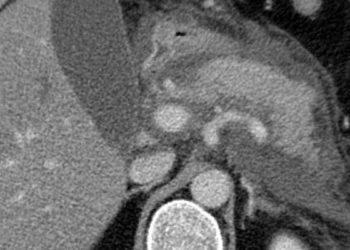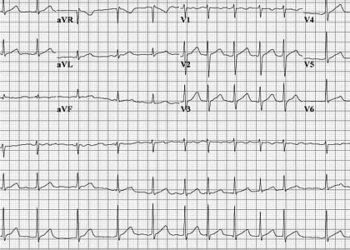Triple therapy with rivaroxaban reduces bleeding compared to warfarin: The PIONEER AF-PCI trial
1. In patients with atrial fibrillation (AF) who undergo percutaneous coronary intervention (PCI), treatment with rivaroxaban, in addition to dual antiplatelet therapy (DAPT), led to significantly lower rates of clinically significant bleeding compared to treatment with DAPT and dose-adjusted vitamin K antagonist.
2. There were no significant differences between the treatment groups in regards to rate of death from cardiovascular causes, myocardial infarction, or stroke.
Evidence Rating: 1 (Excellent)
Study Rundown: Patients with AF who undergo PCI and receive stents have been typically managed with dual antiplatelet therapy (DAPT) with a P2Y12 inhibitor and aspirin, in addition to oral anticoagulation with a vitamin K antagonist. Rivaroxaban has become a commonly used oral anticoagulant for stroke prophylaxis in AF. The PIONEER AF-PCI trial compared two treatment strategies using rivaroxaban and DAPT with a dose-adjusted oral vitamin K antagonist and DAPT strategy in patients with AF who underwent PCI. The aim was to compare the safety of the treatment strategies after PCI with stent placement for patients with paroxysmal, persistent, or permanent nonvalvular AF.
The rate of clinically significant bleeding was significantly lower in the groups receiving rivaroxaban compared to the standard group treated with vitamin K antagonist. There were no significant differences between the three groups in the rates of death from cardiovascular causes, myocardial infarction, or stroke, though the study was not sufficiently powered to assess for superiority/non-inferiority with regards to the secondary outcomes.
Click to read the study, published today in NEJM
Relevant Reading: 2016 ESC guidelines for the management of atrial fibrillation developed in collaboration with EACTS
In-Depth [randomized controlled trial]: This was an open-label, randomized, controlled, multicenter study. A total of 2124 participants were randomized to one of the following three treatment groups: 1) rivaroxaban (15 mg/day) plus a single P2Y12 inhibitor for 12 months, 2) very-low-dose rivaroxaban (2.5 mg BID) plus DAPT for 1, 6, or 12 months, or 3) standard triple therapy with a vitamin K antagonist plus DAPT for 1, 6, or 12 months. The main inclusion criterion was newly documented AF within 1 year prior to screening. Patients were also eligible if they had documented AF over 1 year prior to screening and had been receiving oral anticoagulation for AF for 3 months prior to the index PCI. The primary endpoint was the occurrence of clinically significant bleeding during the treatment period. Secondary endpoints included the occurrence of a major adverse cardiovascular event (death from cardiovascular causes, myocardial infarction, stroke), each component of the major adverse cardiovascular event endpoint, and stent thrombosis.
At 12 months, clinically significant bleeding occurred in 16.8% of group 1, 18.0% of group 2, and 26.7% of group 3 (HR for group 1 vs. group 3 0.59; 95%CI 0.47-0.76; p < 0.001; HR for group 2 vs. group 3 0.63; 95%CI 0.5-0.8; p < 0.001). Significantly lower rates of bleeding requiring medical attention were observed in group 1 and 2 compared to group 3 (HR for group 1 vs. group 3 0.61; 95%CI 0.47-0.80; p < 0.001; HR for group 2 vs. group 3 0.67; 95%CI 0.52-0.86; p = 0.002). There were no significant differences between the groups in rates of death from cardiovascular causes, myocardial infarction, or stroke (Kaplan-Meier estimates, 6.5% in group 1, 5.6% in group 2, and 6.0% in group 3).
Image: PD
©2016 2 Minute Medicine, Inc. All rights reserved. No works may be reproduced without expressed written consent from 2 Minute Medicine, Inc. Inquire about licensing here. No article should be construed as medical advice and is not intended as such by the authors or by 2 Minute Medicine, Inc.








